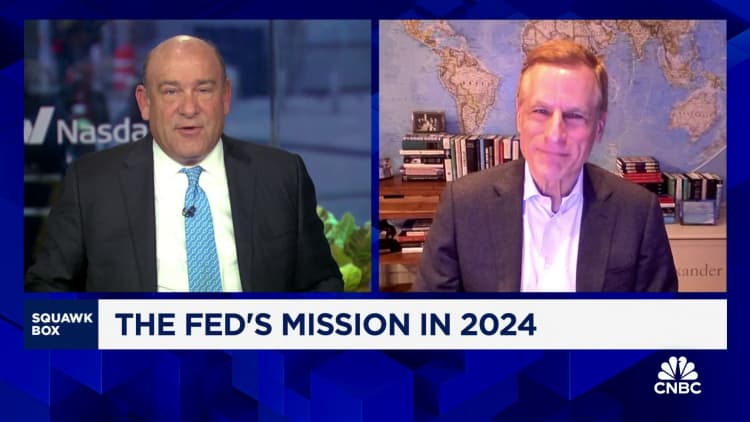The U.S. avoided a recession in 2023. What’s the outlook for 2024? Here’s what experts are predicting
A soft landing or mild downturn may be in the cards for the U.S. economy in 2024, according to experts. These tips can help investors prepare.

Grocery items are offered for sale at a supermarket on August 09, 2023 in Chicago, Illinois.
Scott Olson | Getty Images
Heading into 2023, the predictions were nearly unanimous: a recession was coming.
As the year comes to a close, the forecast economic downturn did not arrive.
So what's in store for 2024?
An economic decline may still be in the forecast, experts say.
The prediction is based on the same factors that prompted economists to call for a downturn in 2023. As inflation has run hot, the Federal Reserve has raised interest rates.
Typically, that dynamic has triggered a recession, defined as two consecutive quarters of negative gross domestic product growth.
Some forecasts are optimistic that can still be avoided in 2024. Bank of America is predicting a soft landing rather than a recession, despite downside risks.
More than three-fourths of economists — 76% — said they believe the chances of a recession in the next 12 months is 50% or less, according to a December survey from the National Association for Business Economics.

"Our base case is that we have a mild recession," said Larry Adam, chief investment officer at Raymond James.
That downturn, which may be "the mildest in history," may begin in the second quarter, the firm predicts.
Of the NABE economists who also see a downturn in the forecast, 40% say it will start in the first quarter, while 34% suggest the second quarter.
Americans who have struggled with high prices amid rising inflation may feel a downturn is already here.
To that point, 56% of people surveyed by MassMutual last year said the economy is already in a recession, while a Nationwide survey from this year found Americans fear a downturn as severe as 2008.
Layoffs, which made headlines at the end of 2023, may continue in the new year. While 29% of companies shed workers in 2023, 21% of companies expect they may have layoffs in 2024, according to Challenger, Gray & Christmas, an outplacement and business and executive coaching firm.
To prepare for the unexpected, experts say taking these three steps can help.
1. Reduce your debt balances
More than one third — 34% — of consumers went into debt this holiday season, down from 35% in 2022, according to LendingTree.
The average balance those shoppers are taking away is $1,028, well below last year's $1,549 and the lowest since 2017.
But higher interest rates mean those debts are more expensive. One-third of holiday borrowers have interest rates of 20% or higher, LendingTree reports.
Meanwhile, credit card balances topped a record $1 trillion this year.
Certain moves can help control how much you pay on those debts.
First, LendingTree recommends automating your monthly payments to avoid penalties for late payments, including fees and rate increases.
If you have outstanding credit card balances that you're carrying from month to month, try to lower the costs you're paying on that debt, either through a 0% balance transfer offer or a personal loan. Alternatively, you may try simply asking your current credit card company for a lower interest rate.
Importantly, pick a debt pay down strategy and stick to it.
2. Stress-test your finances
Much of how a recession may affect you comes down to whether you still have a job, Barry Glassman, a certified financial planner and founder and president of Glassman Wealth Services, told CNBC.com earlier this year. Glassman is also a member of CNBC's Financial Advisor Council.
An economic downturn may also create a situation where even those who are still employed earn less, he noted.
Consequently, it's a good idea to evaluate how well you could handle an income drop. Consider how long, if you were to lose your job, you could keep up with bills, based on savings and other resources available to you, he said.
"Stress-test your income against your ongoing obligations," Glassman said. "Make sure you have some sort of safety net."

 Troov
Troov 
































